Tell us a little about yourself, your family, including how you got started as a journalist?
I was born in Prizren, and my family and I had to leave the city just after the conflict ended, in June 1999, like most of the Serbs from Kosovo. At that time, Serbs thought that they had to leave Kosovo because they did not feel safe, and that the peace agreement was not something that could bring them security. So, majority left Kosovo. My family and me too. We have been in Serbia since then, but all the time having connections with Kosovo, job, our friends there and our hometown. Returning to Kosovo in 2000 and starting as a junior journalist assistant in the multi-ethnic Radio Blue Sky, which was a Swiss project at that time, was the decisive moment in my carrier.
This year it’s been twenty-one year in journalism, an anniversary I am not fully aware and that I need to celebrate for sure. I started in journalism as a Radio journalist, then gradually reporting for all other media formats, print, TV, and web. So, throughout all these years, I have been a journalist, editor, manager, and a trainer, working in different media fields, from reporting to self-regulation, communication, media management, and lately a trainer in media ethics and media literacy. Now, since 2017, I have been a correspondent of Radio Television of Kosovo from Belgrade. I deal also with the trainings in media and information literacy, ethics, and journalism production. I have been a member of a fellowship program, finished different trainings in media, and I am a member of the civil society platform in Kosovo. Regarding the formal education, after finishing the Faculty of Teaching I completed MA studies in journalism. I have received two awards, one from the Association of Professional Journalists of Kosovo and IREX in 2003 for “brave in journalism”, and other in 2009 the award for “media contribution in the integration of minorities into Kosovo society”.
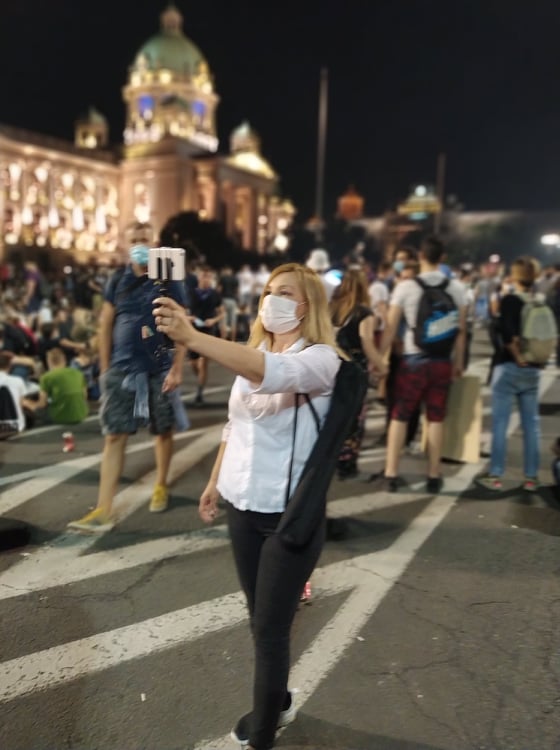
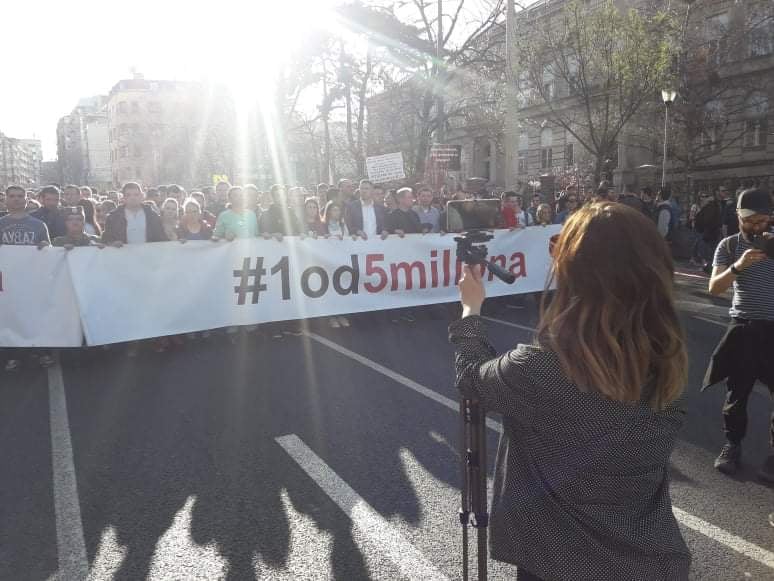
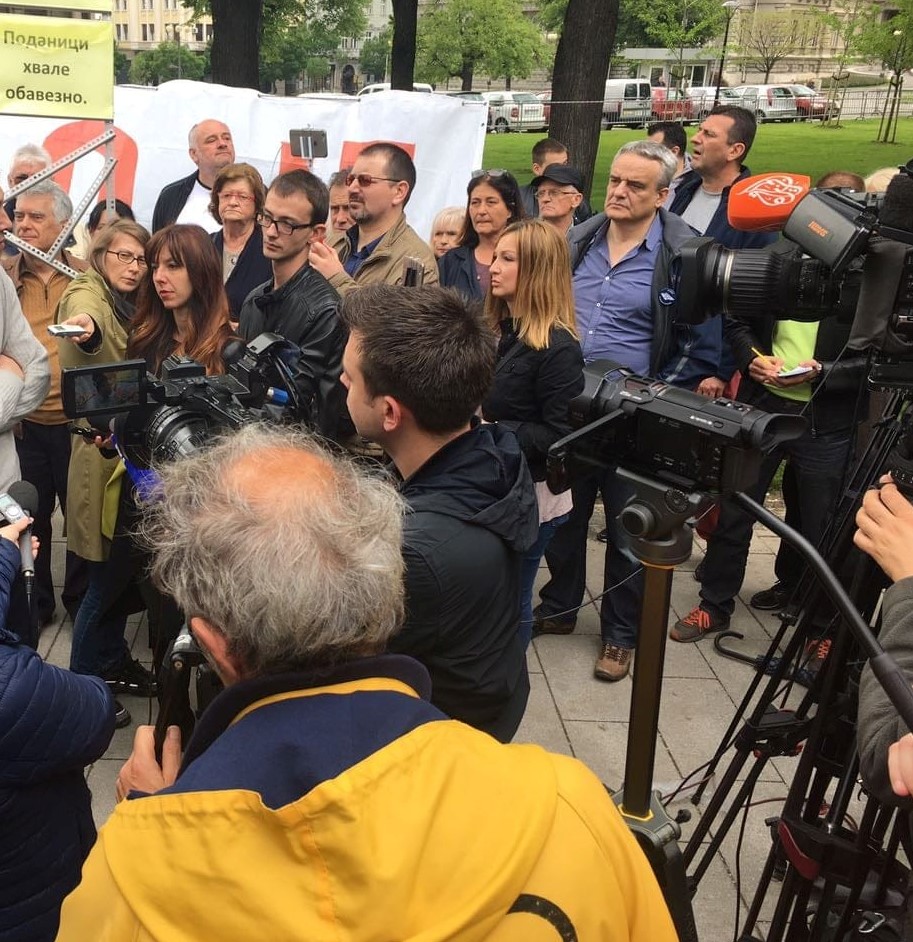
You left Kosovo 1999, and then you returned after one year to begin your career as a journalist in Kosovo, at a time when this was not an option for the majority of Kosovo Serbs. Why you decided to be different?
Being a different, being a courageous, being a visionary, that’s the essence of life and living, as I see it today. I fell that one could hard decide to Ieave the place of birth for god, and especially if that is imposed. I lived in a city with culturally melting point, where many cultures met and cohabitate and enrich each other. We were proud of that, just as Kosovo is today proud when presenting the city of Prizren, history, cultural differences, old squares, traditional clothing, unique lifestyle, people with stories, beautiful temples for worship. Having that feeling, I knew that I would always be a refugee (although we were called displaced persons), a person, like many other Serbs from Kosovo, who most probably would never return to the hometown. I always knew it was not my guilt nor my family, it was the cause and consequence of the politics at that time. So, why I decided to return?
I thought it wouldn’t be ever possible, and I saw my destiny as an unknown island, when after the war becoming a refugee, or internal displaced person, that I was going into the world I never knew. How would we survive, can we ever get back, would we ever get normal housing…so many questions. While at the same time on the other side Albanians were suffering, trying to get their lives back, to measure the tragedy they faced.
I wanted to go back and see what the possibilities are. The people were not unknown to me, those are my people, Albanians, Serbs, Turks, Bosnians, Roma. So, when I returned and decided to be different, to change certain perceptions, that was my response or reaction to new reality, new opportunities, and new political circumstances. Everything new, but old me, who thought that it was a duty of our generation to do things better, to bring positive changes, which the Kosovo society needed and struggled for a long time.
In that kind of situation, you just don’t have a plan, you suffer and feel pain because of uncertainty. When the opportunity came for me to try something different in the new radio which had an aim to bring together communities, divided by the war, I saw a sign that maybe I should try, didn’t have anything to lose… So, having the university education, having lot of interest, understanding the situation in Kosovo, what happened to Kosovo Albanians and Serbs, knowing how to think in an objective manner, I thought I should try. And that was so important moment.
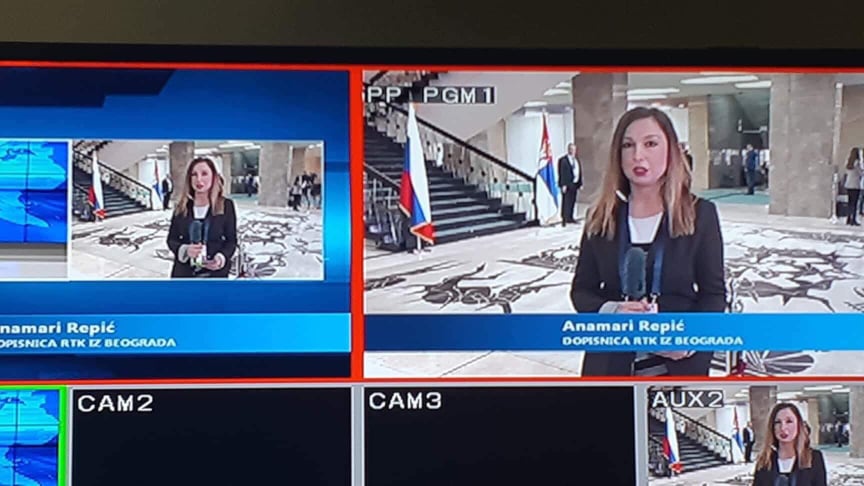
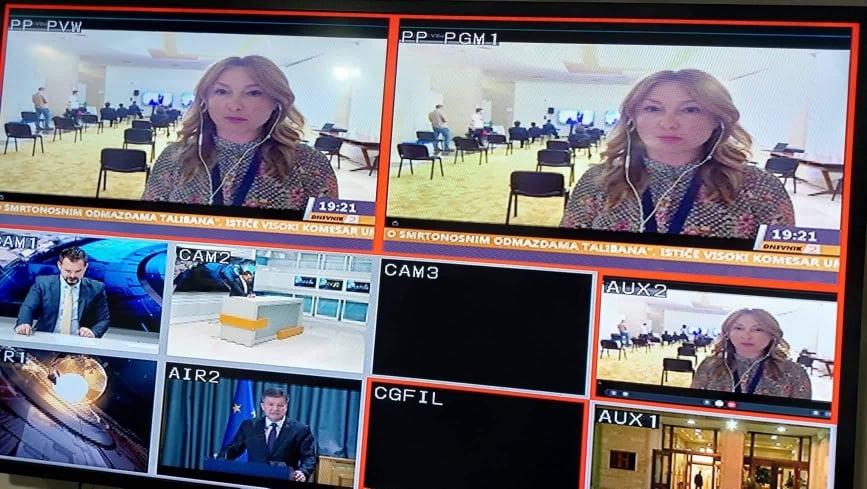
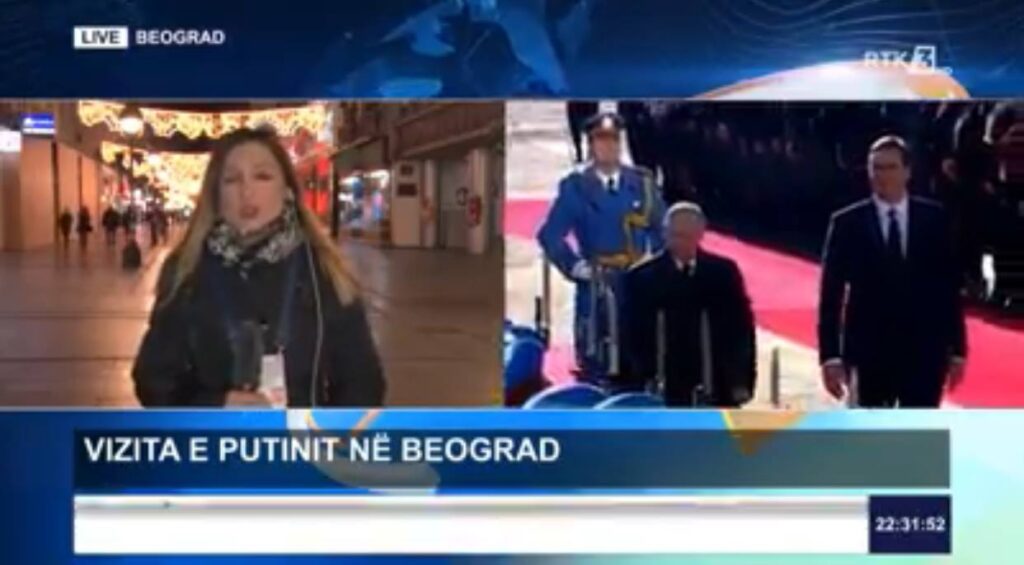
Your professional work…
As a journalist I have always seen myself as an active member of the society, where I strive for freedom, free speech, for being different, where two neighbours in one building can belong to different cultures. I have been given a challenging and unique opportunity. To use my energy, ideas, and motivation to learn more on how to contribute to the specific information environment. When in one society not all its members fill free, when being different could be trouble, then civil society like journalist, have duty to act and start changing that. Those changes sometimes could be very challenging, since you would need to intervene within the society, and within the institutions-policy makers, which not necessarily would support you. I understand this fight as an essential for the society, for the well-being of citizens, for his/her, for intervening within the system so that it becomes a service.
My work as a journalist and a member of the Serbian community in Kosovo, is another motivation for me. So, my first stories were about covering new reality, life of two divided communities and how the life and political environment was rebuilding, and what was especially important to me was reporting about the Serbian community who at that time lived in the enclaves, closed and in fear. Then, I realized that it was it. I am going to learn more because journalism was not just a job or a motivation, a mission, but possibility for an active but responsible participation in the society, which was divided and burdened by the recent war and tragedies.
You had your own TV show “Everything is Possible with Ana”. Can you tell us a little more about this show.
It was about the difficulties of the Kosovo society and its citizens faced, so it was more symbolism that all good and all bad could be possible. We were living in a very difficult and complicated time, when the improvement of the interethnic relations and cooperation was the aim all of us who wanted to live in peace and prosperity. The TV show was about bringing Serbs from their enclaves so that they discus about their lives and present themselves to the wide public. I was producing and moderating the TV Show called “Sve je moguce. Sa Anom” (Anything is possible. With Ana). The aim of this TV show was to create a public safe space within the Kosovo community, where Kosovo Serbs’ voices and opinions could be heard. At that time, my team and I thought that open dialogue and debate was the key which could provide a problem-solving atmosphere. The guests were citizens, politicians, opinion makers, CSO representatives, Serbs, Albanians, internationals…It was one year show, and at that time we heard various experiences about everyday life, fears and hopes for the future, answered and unanswered questions.
Serbs were seen only through the prism of the political statements and ethnical prejudices. So, this show had an aim to start the political and social dialogue, so that you via TV at your home start learning about the life of a community with whom you don’t have any communication, or real objective information. This was the possibility for Albanian and other communities, and Serbs as well, to see analyse and think about the possibility of living together in peace. It is the most important thing in journalism to bring people to talk about their lives, hopes, worries and struggle in try to build life in the political environment different from the one it was in the past. The show presented, among other things, that every ordinary citizen had the same worries in terms of trying to get job, better education, health care, to think about the future, and above all to live in peace in stability. When people see they have similar or almost the same problems and challenges, then you can bring them close to each other and they can start communication and interaction.
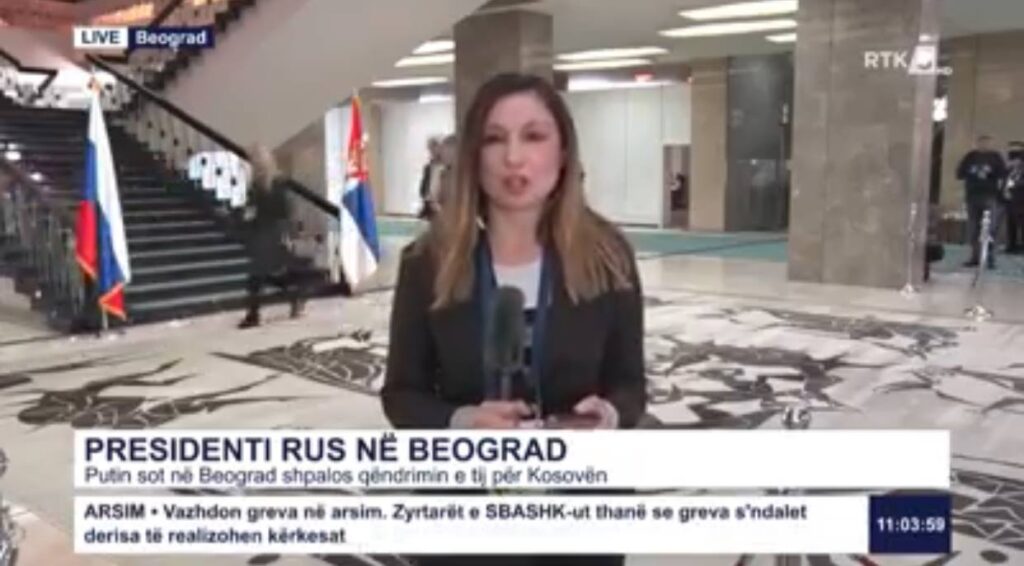
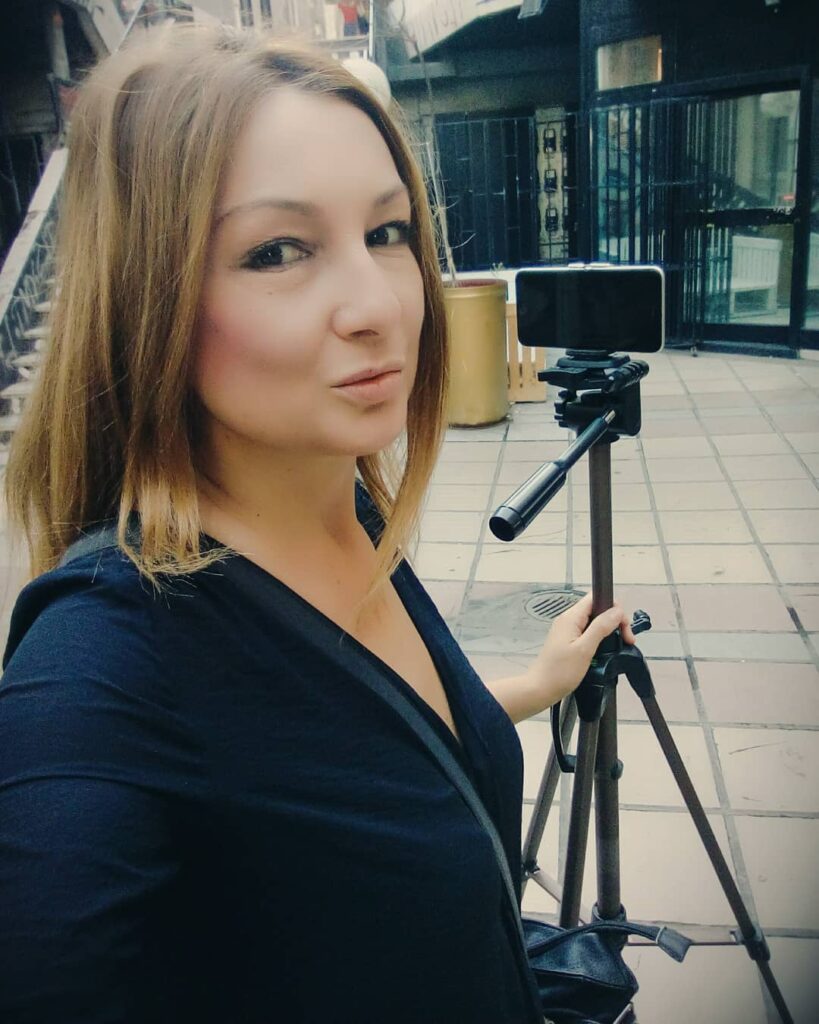
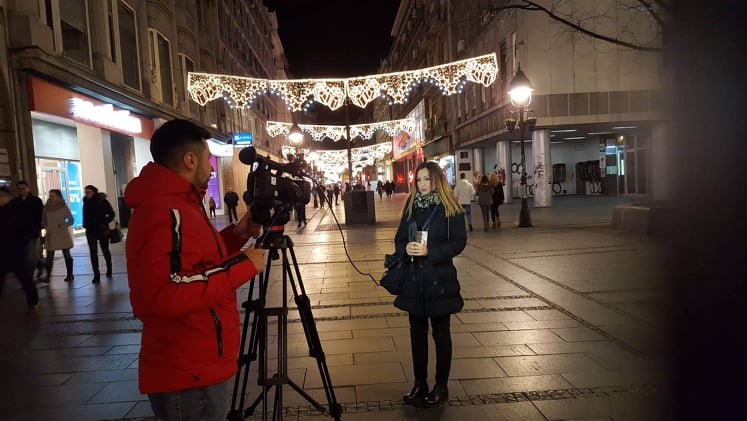
You held the position of deputy director of RTK, the public broadcaster in Kosovo. Can you tell us a little more about this work.
I was deputy in two terms, and that was really challenging period because we were trying to establish Serbian TV channel, with that the law would be changed, and strengthen other communities’ programs, in all platforms. To my mind all the time was this idea on how to develop one joint public broadcaster that would be an address to all communities. I participated at the general managing work of the public broadcaster, when the priority was establishment of the Serbian TV channel, as part of the Kosovo public broadcaster. It was work in developing minority programming, bringing them closer to public, to communities, interacting with them. The RTK has programming in several languages, Albanian as majority, then Serbian program on TV, Radio and web, programming in Bosnian, Turkish, Roma, Montenegrin language, etc. It was about promoting the work of the PBS of Kosovo, making joint media content with other local media, and above all working for the communities’ needs to be met. So, my duty was to participate and contribute to the changes, with the specific matter of bringing public broadcaster closer to the communities. It was the period of the law changes, while at the same time preparing for the digital changes in the technology and the content.
What was your biggest challenge in your work?
It was the period after the war, my first years as a junior journalist, and later while participating in the establishment of the Serbian TV channel of RTK. The challenging was to be a journalist in the environment when first yourself was not so safe and you had to report about the life of those who fill unsafe, about the institution building, about the divided life of two communities, and at the same time being professional, objective and trying to learn all the time. While being a journalist reporter, I visited many places in Kosovo producing stories about everyday life, the community struggle, hope, positive stories, mainly working on the inter-ethnic issues. That was my biggest challenge as it was not just an ordinary journalistic work, it was about carefully reaching those people, sometimes because they lived in the enclaves it was careful planning, reaching them, explaining them why it was important to hear their stories, etc. The second challenge comes 10 years after, in 2010, when the establishment of the Serbian channel started, with ideas developing, plans, public awareness campaign. The biggest challenge was to deal with the resistance of the Serbian journalistic community to this channel, as they wanted to have TV which was not part of the Kosovo public broadcaster. Today this TV channel functions as part of RTK, where dozens Serbian journalists work, providing space for the community and all citizens in Kosovo to discuss all open issues. The main challenge of this TV channel remains the outreach, as there is still limitation in the signal transmission.
You have been vice-chairperson of the Press Council of Kosovo. Very often the councils are existing only on paper. How it is in Kosovo?
I see self-regulation as one of the most important aspect of journalism. It is the thing that you know the rules, sensitivity, challenges, restrictions, freedom, but still, you have enough space to do a story respecting the standards and respecting the freedom of speech. This balance is core of journalism.
I think that people in Kosovo have been informed and there was an awareness about the work of the PCS, but it is never enough. It is recognized as a self-regulation body, it is consulted, people make appeals, it is invited to give advice, etc. I think that Kosovo should be proud of this body and its work. Regular awareness campaigns could help in reaching out the citizens, and education sessions. People think that they don’t have enough power to change things, but they regularly need to be told that in democracy there are professional bodies, such as press council, which can deal with specific media issues, in press and online. Today more than ever it is needed. I think that the main challenge remains the communities’ outreach and involvement of the communities’ media, especially Serbian.
How you see the media situation in Kosovo today?
Beside all similar problems in the world, there is an additional challenge of having divided life, and with that in general media that are ethnically divided. In the divided society or society where two communities, Albanian and Serbian, live in different realities, this job becomes more difficult and complex. The main problem is reporting most of the time about your own community, and just when there are problems, you report about other community. That kind of reporting is additionally creating uncertainty and unclarity. I think that it would be important to change that, especially in one multi-ethnic society, where still political problems have not been solved, and a society where two communities do not listen to each other, do not listen each other’s problems, hopes. I don’t see that there is a discission in the public sphere about this, that two communities discuss these issues, that professionals gather, make some proposals, basic changes, we still lack communication, and interaction, and that reflects the media work and media content. It is still representing persons who don’t belong to our community as “other”, and I consider that situation is not a road to a happy future for everyone.
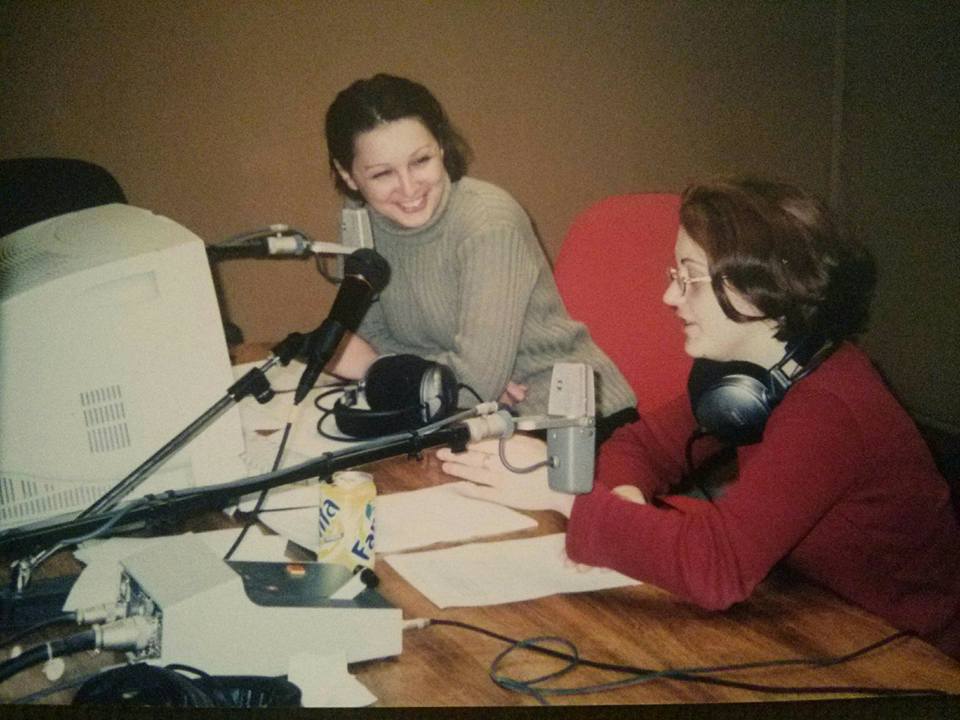
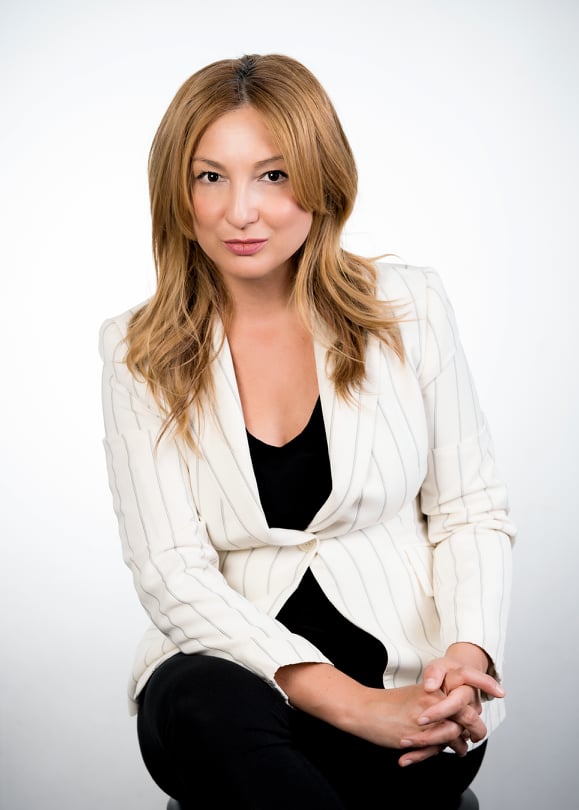
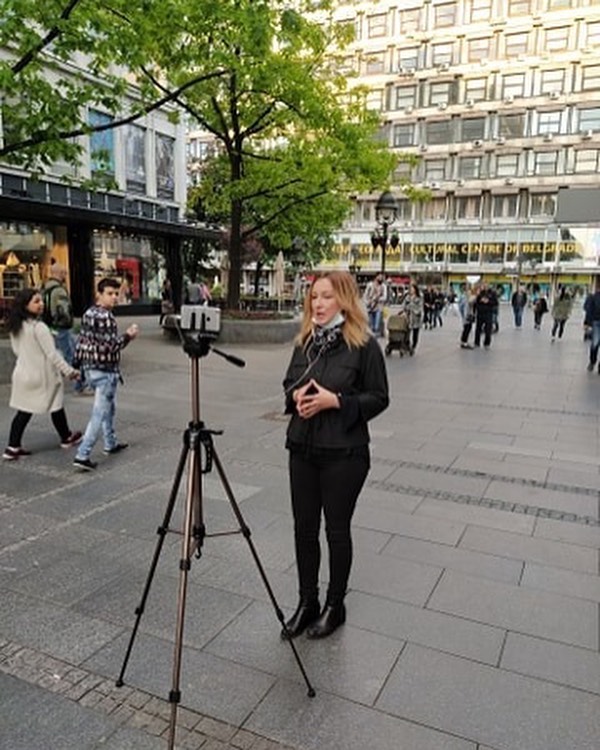
How you see the role of Serbian media in 90´s ?
The 90´s was very difficult time. It was a period of growing up, getting education, trying to find your place in the society. Those years were lost, we lost our years, we waisted our youth, possibilities for a society without tragedies. But, instead of that we were living the darkness time, with the war-torn region, and hate around us. Media created such an atmosphere that every atom of possible peace was destroyed. I remember going to a high school and my friends Albanians had to protest in front of the Gymnasium because they were not allowed to go to school, and that was one of the many political problems that were appearing every year of the decade. Watching them from the window of the school I was thinking why the school was not allowed to them, why I was privileged, etc…I saw that nothing will be the same anymore. In that political circumstances, the media were poisoning the space, spreading the hate, and blaming one side for instability. State television at that time was a propaganda tool of a dictatorship and that was obvious if you’d use your common sense, and just see around you. At the time of crises, you could easily be manipulated by the government. They were presenting “us” as a superior who should defend their country. It was everyday putted in the people’s heads, no matter if you saw something else in the street and in your neighbourhood. They would believe the authorities. And the end was – we know.
However, there were professional media, which was hard to reach to listen or watch, but they were my heroes who risked lives in staying faithful to the truth, reporting truth and against the Serbian regime. I remember trying to get BBC, Radio Free Europe, Deutsche Welle and others to get the real picture about what was happening around you, and the international community point of view. With that all the time just waiting that things would soon get better. But it wasn’t. So, the everyday life looked like listening, watching, reading the news, and watching around you, in fact witnessing that one life would never be the same. In that atmosphere, the media were my life, professional ones, which gave me a hope and helped me to understand that that the politics of the Serbian regime was about dictatorship, propaganda, hate, misinformation, call to act against the ones that were represented as “others”.
What is your comment about the today reporting of Serbian media about Kosovo?
Reporting about Kosovo in Serbia is mostly about emotions above facts and analysis. Accept few professional media, which report unbiased, the media situation in Serbia regarding Kosovo is problematic. The most media are state controlled by finances, politically or other interest. They promote the politics of the state against Kosovo and its status, which could be seen in everyday narrative, in the press, portals, broadcast media, local, regional national. Sometimes you just fell like there is a parallel life, the one real one, and other controlled and imposed by those media/tabloids. On the other hand, many media from Serbia have their corresponds from Kosovo, and they should use this to opportunity and deal with the issues from all communities, to challenge the narratives with the facts from the field, etc. They impose the narrative that promotes hate speech, biased reporting, partially presented or misused facts, historically based emotions instead of reality. What kind of public opinion could be created in this way? Not the one for sure which is open minded, with analytical approach, the opinion which understands what has been happening, etc. In general, in Serbia lacks open debates about relationship with Kosovo, about the past and the role of Serbia during the 90s, about the actual moment, about the life of Serbs and their participation in the institutions, society, how to install communication, etc. Thus, the media should not just promote leaders, but media should promote first facts, debate, and communication. That can be their role for better society and future. I need to point that some media have had stories from Kosovo, interviews with the institutional leaders, about Albanians, their life today. But it is needed even more. In general, it is needed the exchange of journalists, promoting stories of everyday life…Many things could be done, just we need the will and a vision. There should be a need to understand.
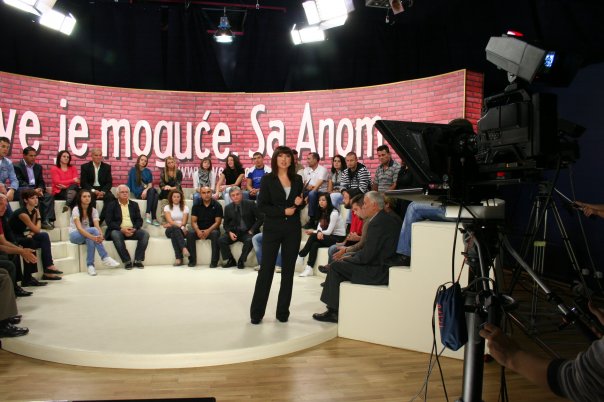
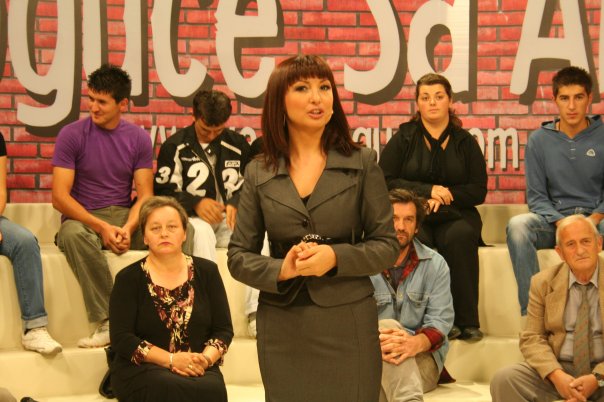
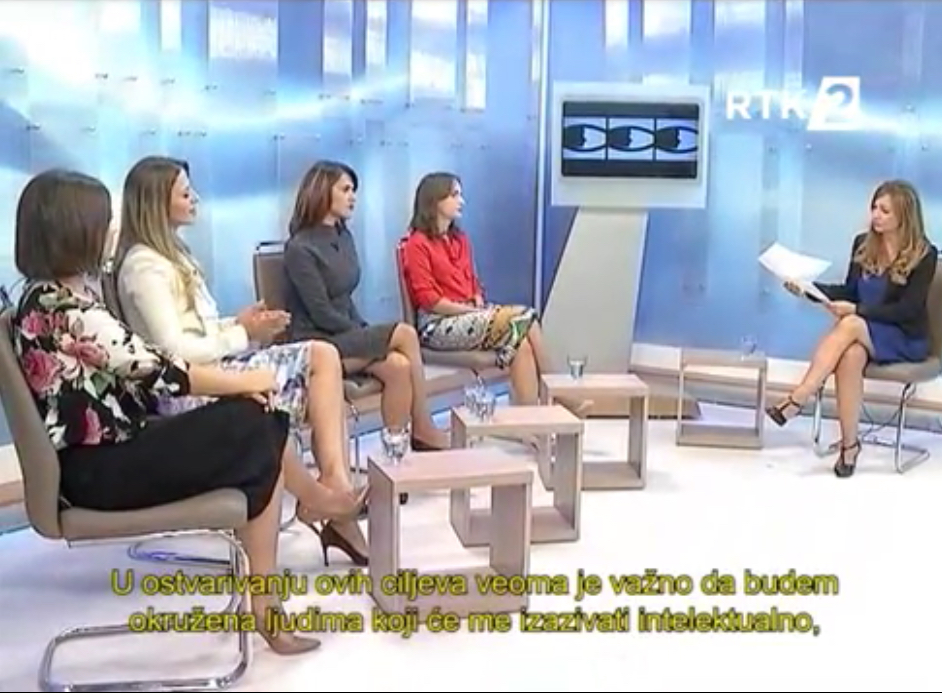
How hard it was to stay always professional as journalists?
It could be hard in the circumstances when you report about the struggle and hard life of the community you belong to. It is a thin line. But the line is crossed only for those journalists who think that objectivity and independence in this circumstance could be negotiable. This “hard” you fell every day, and it is a measure of the quality that you provide. Not all of us could be investigative journalists, but with the everyday work on daily stories, reportages, interviews, analysis, we can show that it is a hard work behind being a professional as journalist. You need to fight different invisible enemies, so that you freely look behind the story, between the lines, refusing agendas, etc.
Your Albanian is fluent what should be also normal, as people should use many languages in the communication, especially if we have a diverse community. But still, many Serbs from Kosovo do not speak Albanian, many Serbs who left Kosovo never learned Albanian language. Why?
I have to say that it is normal to speak languages if you are from Prizren. When you hear different languages in the street, around you, from you first neighbour, that becomes your culture, your value. I consider that previously this was a political issue. Today, I know many people who would like to learn, some think it is not needed, some say it is hard to learn, some say not enough time. On the other hand, I also see people around the world who just learn languages, so the time and space are that’s not an issue. I would always think to give some advices, such as – just as you learn English you can start learning Albanian. I think people need to be supported, encouraged, and motivated. I was motivated because I have always been surrounded by different languages. When my Albanian colleagues were speaking to me in Serbian, I was thinking “I have to learn Albanian, that’s not fair”. The language was not strange to me. Going back again, in the ex-Yugoslavia we were learning languages. As I just started learning Albanian in the primary school, the 90s came and the Albanian language was expelled from the curricula. I started again learning from 2000, step by step, communicating with colleagues, friends, and now I know, not perfect, but I am trying. As a journalist I want to know what is happening around me, who is saying what, and especially because I come from the multi-ethnic environment. So, my social and professional life is richer, and I am proud when not just in Kosovo, but in Albania when I start speaking Albanian and they don’t know that I am a Serb. When they realize it, they are glad, and I am proud. Now reporting in two languages is a real challenge and something that someone should be proud of especially in this region, where our differences have been a reason for hatred and not for prosperity and strength of the society. So, reporting in two languages, from Belgrade in the moment when political negotiations are ongoing, in the period of constant tensions, when two sides try to decide about the relationship they want to achieve, and when two societies need to start communicating, exchanging, understanding, and promoting each other. This is an important moment to report about, and one step further for me and a huge responsibility.
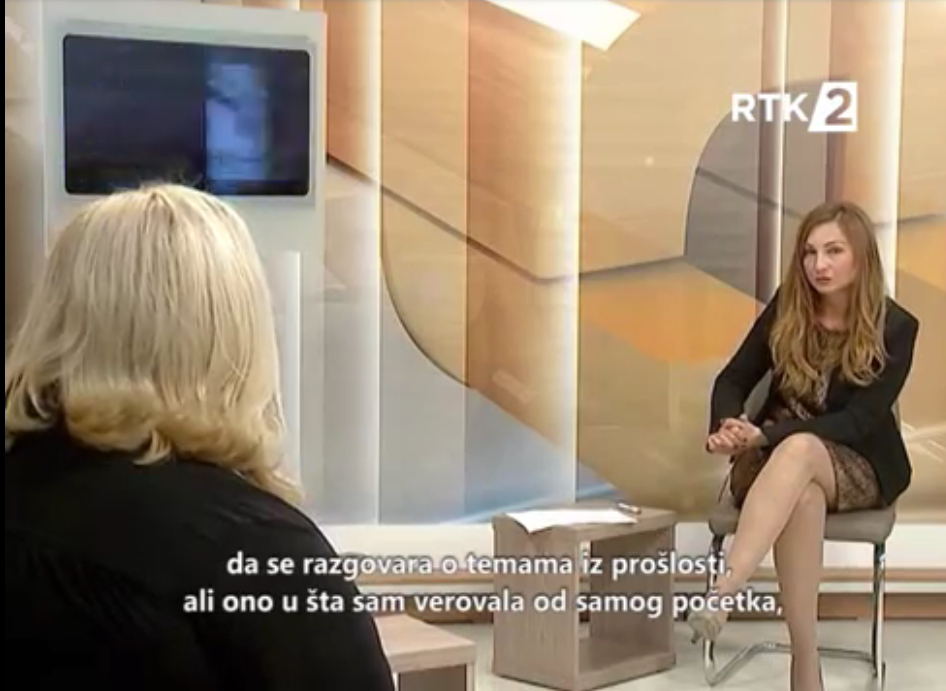
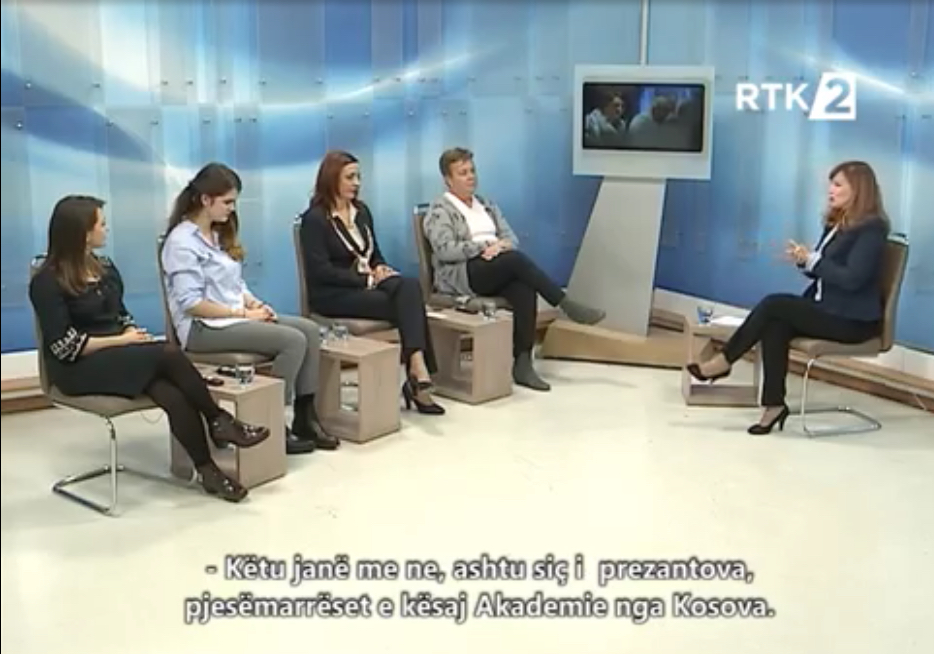
How important is the work of SEEMO as a press freedom organisation?
The professional organizations have enormous relevance for the journalists and for the protection of the principles. Most of the countries in the region have their own local or national journalistic associations, but the regional one has additional importance. SEEMO is an umbrella, the housing roof that offers a safe space. It means that the organization is needed when protects and reacts, when interacts with journalists and stake holders, and when promotes new trends and new knowledge. The most important thing is offering a network for the communication and possible cooperation among journalists and media representatives, and listening their struggle, but also ideas and possible solutions. Journalists are busy by everyday field work, and it is important that they have somebody to think about their rights and position in the society……
Please walk us through a typical workday. How do you manage your time today?
It is just a usual journalistic day. Starting with reading and watching all news outlets, traying to get in the morning different perspectives of the stories and possibly new angles of the events. I usually organize my interviews and fieldwork because I am today what is being called the MoJo, or a journalist who works with her mobile (shooting, editing). This was the challenge in the beginning but later you just realize how it can be helpful when you have all what you need in your hand, literally. After doing a fieldwork then it’s time for writing and producing. I think that journalists have the same workday, as you say typical. Whatever you do in your free time, you are never detached from the media, daily events, you cannot have an empty period because you always need to catch-up, sooner or later. So, having morning coffee with the news, working on the news, and in the evening TV shows getting the follow up of the events. Somewhere in the middle is this space for books, family, and entertainment.
Finally, as press freedom, human rights and democracy are very important in your life, can you give please some advice for younger journalists?
The media work today is influenced by the market, owners, political influences, but the journalists should understand their role exactly the way they learn in the schools. We must be at public service, independent in thinking, objective. You don’t learn in the journalistic school that you should be partial, you may learn that later, when you accept or not accept to be influenced by financial and political influences. It is important that you report about the ones who are vulnerable, look around you, they can be everywhere, they can be people who speak other language, coming from different culture, but it is your journalistic duty and obligation to report about all equally. Be open for new knowledge, new perspectives, and develop your reporting style. Never say “our government”, it is a/the government. If you report about sport, culture, lifestyle, the same journalistic principle counts as for political reporting, but the tactic is different.
